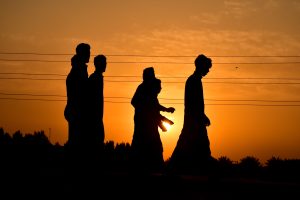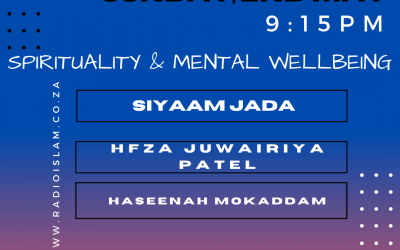The principal points of the Muslim Creed are: Belief in Allah (the God), Allah’s Angels, Allah's Messengers, Allah's Books, and Belief in life after death (Aakhirah); the Day of Resurrection (Qiyaamah) and Qadr.
The fifth point in Muslim creed is to believe in life after death; to believe in the Day of Resurrection. This is the most important article of faith in Islam. It is in fact, the basis upon which Islam builds its whole philosophy of Life. A person cannot be a Muslim until after he/she accepts this principle. The advent of resurrection or Qiyaamah is more frequently mentioned in the Noble Quran than any other happening. On the day of Qiyaamah, all human beings will be resurrected and will have to pass through Allah's judgment on their actions during this ephemeral life on earth. All this is vividly described in the Noble Quran. The word, Qiyaamah, occurs 68 times in the Quran, and the word hereafter occurs 118 times in translations of the Quran. The Quran argues that resurrection is rationally possible.
Temptations of this world and its transitory pleasures often make man forget that the life hereafter is an impending actuality. Many of those who claim to believe in the life to come act and behave as if it belonged to a distant future, and had no bearing to their present activities and manner of living. The Quran repeatedly reminds men that the Hour of Reckoning is not a distant possibility, but very close to man, and could come to pass any moment. Some possibilities are: Nuclear warfare, huge meteors/asteroids striking the earth, deadly epidemics, natural disasters: tornadoes, earth quakes, volcanoes, etc., Ozone hole, pollution, depletion of fuel in the sun, etc.
The wisest course for man, therefore, is to be always alert and guard and navigate clear of all forms of sin and impiety, for when the Promised Hour comes it will come and without any prior notice. Hence in the Quran almost every Surah mentions who moves and acts of his own free will; protects himself and ensures the preservation of the species. Most importantly, there is the moral aspect of man's being, which is endowed with the consciousness of good and evil, the faculty to discriminate between the two, and the power to do good as well as malevolence. Man's nature demands that good deeds should have good results and evil deeds should lead to evil consequences. Man is endowed with the faculty to discriminate justice from tyranny; truth from falsehood; right from wrong; mercy from cruelty; kindness from malevolence; generosity from meanness; trustworthiness from breach of trust, etc. These qualities are not abstract ideas but are actually experienced in human life and have a deep and far-reaching effect on human civilisation. Hence man's nature demands that his acts should lead relentlessly to their moral consequences; in the same way as they lead to their physical effects.
If a man kills another human being, the moral consequence of the act should be the punishment of the criminal commensurate with the damage that he has caused to the family whose member was killed. It is possible that the offender may go scot free and even remain happy and become prosperous after having killed another human being. Justice demands that the offender must be punished. Since this has not happened in this world, it has to take place in the life Hereafter (Aakhirah). Genghis Khan, Hitler and others caused grave harm to millions of people for countless generations. Under the natural laws that govern the system of the Universe they could not possibly be awarded punishment commensurate with their crimes and acts of senselessness. Even if Genghis Khan or Hitler were to be torn to pieces, this punishment would not be commensurate with the wrongs they perpetrated on humanity. Between 1974 and 1979 Pol Pot killed millions of Cambodians. Thus we see killing, adversity and suffering at the hands of the vested interests. Is it possible to make restitution to such men and women adequately in this short span of life, within the limits of the physical laws that govern the world? The laws that govern the present system of the Universe do not allow an opportunity for complete retribution for the killings of millions of Cambodians.
On the other hand, great prophets, the sages and the pious and virtuous men and women called mankind to the truth and the right path, and guided them out of darkness into light. Their ideas and teachings and practical examples have benefited millions of men and women for centuries; doing good for humankind, bracing against the tempest of consequences of human actions. Also the actions of humans during their short span of life on earth often have effects so widespread and lasting that their full consequences take thousands of years to unfold and manifest themselves fully. And it is impossible for any person, under the present laws of nature to attain such a long longevity on earth.
It is logical to argue that while the present physical world and its natural laws are enough for the material and animal constituents of man, they are quite inadequate for the moral elements of his being. Hence there is a need for another world where the law of ethics is the governing law and the laws of nature are subservient to it; where life is eternal; where the moral consequences of human actions in the material world that could not manifest themselves there, should manifest themselves fully and in proper form. It demands a world where truth and righteousness, and not materialistic things, carry weight; where fire burns only such things as deserve to be burned according to the moral law; where happiness and comfort are the lot of the virtuous, and pain and misery the plight of the wicked. Both nature and reason demand such an order. The Quran assures us that the world that our natures as well as our reason demand shall be a reality one day.
There is no scientific instrument to determine with certainty whether there is any life beyond death. Science can neither affirm nor deny Aakhirah. The question of whether there is any life after death lies completely outside the realm of scientific knowledge. Anyone who declares, in the name of science, that there is no life after death, therefore, makes a very unscientific statement. If a person is of the view that the life of this world is the only life and that there is no life of any kind after this, that person will develop a moral attitude without any accountability for his/her actions in this world. A radically different kind of attitude and approach is bound to result if he/she believes that this life is to be followed by another life where one will have to render account for all of one's acts in this world and that one's ultimate fate in the Hereafter will depend upon one's conduct in this life.
The Quran reveals that this Universe, which was created in accordance with the physical laws, will be demolished at one stroke; and it will be replaced by another world. God Almighty will then resurrect all the human beings who were born from the beginning of creation down to its end, and will make them appear (resurrect) before Himself on the day of Qiyaamah. The records of all the deeds of individuals, communities, and humankind at large, will be there without the slightest error or omission. Also there will be complete reports of the effects and consequences of all human actions in the material world. All of the generations of men affected by them, will be present in the witness box. Every particle affected, in any way, by the deeds or words of men will tell its own story. And the limbs, the ears, eyes and all other parts of the human body will stand witness as to how they were used or abused in life. On the basis of this unimpeachable evidence and those complete records, Allah (swt), the Supreme Sovereign of the Universe, will decide each case with perfect justice and pronounce the reward or penalty as the case may be.
The reward, as well as the punishment, will be of a magnitude that cannot even be estimated by the limited standards of the material world. The virtues whose beneficent effects extend over several centuries in this world will be fully rewarded there, and neither death nor illness, nor old age, will be to cut short the enjoyment of the reward. On the other hand, the evil deeds whose effects and consequences blight the lives of millions in this world for hundreds of years will be punished fully, and neither death nor coma will be able to relieve the pain and suffering of the guilty.


![[Your World Today] Who is in the worst position?](https://archives.radioislam.org.za/wp-content/uploads/et_temp/muhsin-ck-8BcNsqDJy2I-unsplash-1-225x300-9300_225x250.jpg)
![[Sabahul Muslim] Tawakul, Trusting in Allah’s Plan](https://archives.radioislam.org.za/wp-content/uploads/2022/07/Tawakul-on-Allah-is-the-source-of-relief-from-every-hardship-822x1024-1-400x250.jpg)

0 Comments